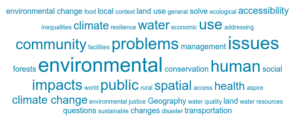What “real world problems” do our applied geography members help solve?

The AAG counts 74 Specialty and Affinity groups for members with shared interests to connect and collaborate, and the Applied Geography Specialty Group (AGSG) is just one of them.
So what sets AGSG apart from other specialty groups? The underlying thread for applied geography is that it moves beyond that which is purely theoretical and sets into action to solve problems. Applied geographers work with government organizations, non-profits, academia, the private sector, and nearly anywhere you can imagine! In a informal survey we shared recently through our online Knowledge Community, we asked our Specialty Group members how they use geographic approaches to solve real-world problems. We received 134 responses and major themes include climate change, natural resource and disaster management, water and food security, community development, sustainability, environmental and social justice, health geography, and land use planning. Some examples of problems people are working to solve using applied geography include: identifying and reducing exposure of vulnerable communities to risks like drought, climate change, mining, agro-chemicals or other risks; facilitating decisions about where to invest in public infrastructure; creating better access to healthcare; resolving natural resource conflicts; more efficiently meeting agriculture and energy needs for the future; developing and revitalizing communities justly and sustainably; and solving transportation issues. While this is in no way an exhaustive list of problems that can be solved using geographic knowledge and approaches, it shows the breadth of applied geographers and active focus areas they are working towards. Impacts of climate change on communities and sustainability seem to emerge as an important and current applied topic, thus our members should make sure to bring their applied perspective at the upcoming Annual Meeting of the AAG within the special theme on “The Changing North American Continent.”
Another theme at the upcoming Annual Meeting of the AAG, will be on “Expanding the Community of Geography”, and – among other groups, is looking for expansion from geographers who work outside of the academy. What better community than AGSG to lead such efforts? The AGSG is a community of practice interested in increasing awareness about applied geographic approaches used in government, academia, the private sector and beyond. While our diverse community shares the common value of applying geographic approaches to solve real-world problems, applied geographers come from a wide range of backgrounds and specializations, providing an incredible opportunity to network and learn from each other. Reflecting our diverse membership, AGSG members are also represented in at least 50 other AAG specialty groups! Based on responses to our survey, a few other specialty groups our AGSG members are affiliated with include: GIS, Urban Geography, Spatial Analysis and Modeling, Economic Geography, Hazards Risks & Disasters, Remote Sensing, Water Resources, Health & Medical Geography, Human Dimensions of Global Change, and Transportation Geography. Through annual meetings, a website, bi-annual newsletters and knowledge community discussions, we facilitate communication and knowledge-sharing among our members. By highlighting successes of our members and offering awards for project development, travel and excellence in applied geography, we also promote and recognize individual excellence in the field from students, faculty, and practitioners from various sectors. In particular, the James R. Anderson Medal of Honor recognizes true ‘game-changers’ in applied geography including well-known recipients like the ‘father of floodplain management’, Gilbert White and Esri founder, Jack Dangermond.
If you want to know more about the Applied Geography Specialty Group — like how to apply for upcoming awards and what kinds of sessions we’ll be sponsoring at AAG Denver – please visit our Community Page, follow us on Twitter, or email the current chair, Dr. Hannah Torres.
DOI: 10.14433/2017.0063